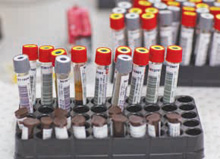 Photo: Kevin Tachman An estimated 6–10 million of the 34
million people living with HIV (PLHIV)
are co-infected with the hepatitis B
(HBV) and/or hepatitis C (HCV) viruses.1
With access to antiretroviral therapy
(ART), PLHIV are able to successfully
control their HIV infection. However,
a recently published study in Nigeria
demonstrated how viral hepatitis can
complicate HIV treatment. These
findings are particularly relevant in the
Asian context, where hepatitis rates
are high and co-infection rates are
increasing as the HIV epidemic grows
across the region.
Photo: Kevin Tachman An estimated 6–10 million of the 34
million people living with HIV (PLHIV)
are co-infected with the hepatitis B
(HBV) and/or hepatitis C (HCV) viruses.1
With access to antiretroviral therapy
(ART), PLHIV are able to successfully
control their HIV infection. However,
a recently published study in Nigeria
demonstrated how viral hepatitis can
complicate HIV treatment. These
findings are particularly relevant in the
Asian context, where hepatitis rates
are high and co-infection rates are
increasing as the HIV epidemic grows
across the region.
In the study, screening tests for
hepatitis were conducted on 19,408
PLHIV in Nigeria between 2004 and
2010: 17.8 percent were co-infected
with HBV, 11.3 percent with HCV, and
2.5 percent with both. More individuals
with HBV (55.4 percent) or HBV+HCV
co-infection (56.7 percent) had weakened
immune systems at the beginning of the
study, defined as having a CD4 cell count
below 200 cells/mm3, compared to those
who had HCV co-infection (52.5 percent)
or HIV alone (48.6 percent).
A sub-group of 3,205 PLHIV began
ART during the study and then remained
on it for a median duration of 4.4 years.
HBV co-infected individuals had an
increase of 144 cells/mm3 in their CD4
levels during treatment and HBV+HCV
co-infected individuals had an increase
of 105 cells/mm3. These increases were
significantly lower than individuals with
HCV co-infection and HIV infection alone
(both >150 cell/mm3).